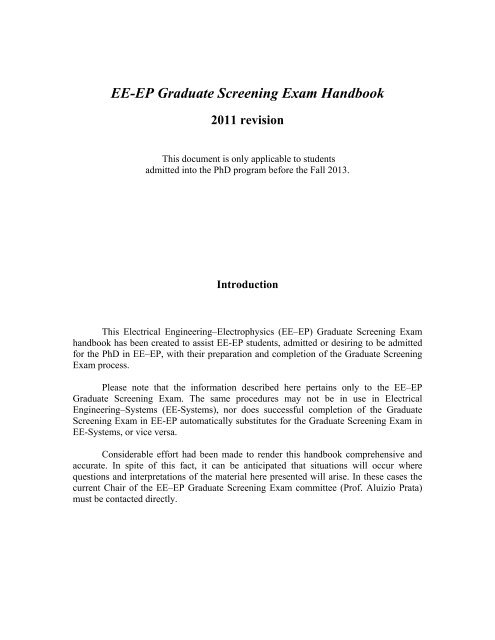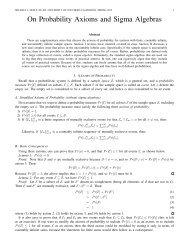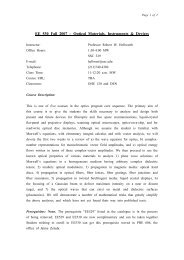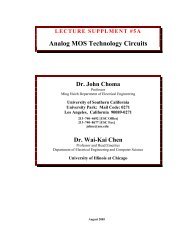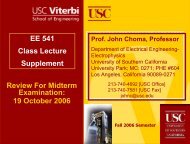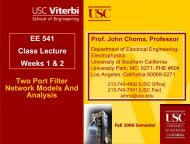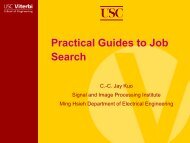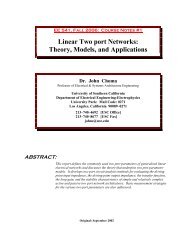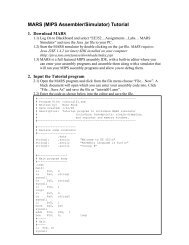EE-EP Graduate Screening Exam Handbook - USC Ming Hsieh ...
EE-EP Graduate Screening Exam Handbook - USC Ming Hsieh ...
EE-EP Graduate Screening Exam Handbook - USC Ming Hsieh ...
- No tags were found...
Create successful ePaper yourself
Turn your PDF publications into a flip-book with our unique Google optimized e-Paper software.
Section OneWhat is the Electrical-Engineering <strong>Graduate</strong> <strong>Screening</strong> <strong>Exam</strong>?The <strong>EE</strong>–<strong>EP</strong> <strong>Graduate</strong> <strong>Screening</strong> <strong>Exam</strong> is an academic process that serves as an entranceexam for doctoral degree candidacy in <strong>EE</strong>-<strong>EP</strong>. Its primary purpose is to assure aminimum level of proficiency with Electrical Engineering matters, as perceived by the<strong>EE</strong>-<strong>EP</strong> department. It is the basis of your recommendation for formal acceptance into thePhD program on behalf of the department to the <strong>Graduate</strong> School. The <strong>Graduate</strong><strong>Screening</strong> <strong>Exam</strong> is mandatory for all aspiring PhD students admitted in <strong>EE</strong>–<strong>EP</strong>, and isrecommended for any Master's (MS) degree students who are planning on applying forthe PhD in <strong>EE</strong>–<strong>EP</strong>. This Section describes the various exam components and addressessome often asked questions.There are three parts to this exam:Part One:Satisfactory Academic ProgressAn average minimum GPA of 3.50 is required in the <strong>Graduate</strong> <strong>Screening</strong><strong>Exam</strong> core courses (Section II of this handbook discusses the corecourses). Additionally you are required to attend any <strong>EE</strong>-<strong>EP</strong> workshopsand seminars that may be scheduled periodically during your graduatestudy program.If admitted to the MS program, a student may apply for admission to thePhD program based on performance in the core courses, i.e. uponsatisfying the requirements presented in this document. However,successful completion of these requirements alone does not guaranteeadmission to the PhD program. Please see the current Chair of the<strong>Graduate</strong> <strong>Screening</strong> <strong>Exam</strong> Committee, Prof. Aluizio Prata, Jaime Zelada,or your academic advisor if further clarification is needed in thisprocedure.Part Two:A commitment of academic support from your thesis advisorReview the research area of each professor in <strong>EE</strong>–<strong>EP</strong> and meet with himor her as appropriate to discuss your areas of interest. Section III of thishandbook provides a list of professors and their areas of interest.
Some students may have advisors outside the <strong>EE</strong>–<strong>EP</strong> Department. Aspecial permission is required in these cases, and must be obtained fromthe <strong>EE</strong>–<strong>EP</strong> <strong>Graduate</strong> <strong>Screening</strong> <strong>Exam</strong> committee prior to proceeding withthe <strong>Graduate</strong> <strong>Screening</strong> <strong>Exam</strong>.Part Three:Meeting with the <strong>Graduate</strong> <strong>Screening</strong> <strong>Exam</strong> committeeAt the beginning of the academic year in which you intend to enter the<strong>Graduate</strong> <strong>Screening</strong> <strong>Exam</strong> procedure (e.g., the beginning of your graduatestudies in <strong>EE</strong>, for those who intend to pursue the PhD degree) you will beexpected to attend a meeting, conducted by the <strong>Graduate</strong> <strong>Screening</strong> <strong>Exam</strong>committee, of the students in the <strong>Graduate</strong> <strong>Screening</strong> <strong>Exam</strong> procedure.This meeting describes the <strong>Graduate</strong> <strong>Screening</strong> <strong>Exam</strong> procedure andprovides advisement on appropriate course registration. At this meetingyou will complete a first year guidance form. In addition, you will havean individual meeting with a member of the <strong>Graduate</strong> <strong>Screening</strong> <strong>Exam</strong>committee annually as long as you are in the <strong>Graduate</strong> <strong>Screening</strong> <strong>Exam</strong>procedure. At this meeting your academic progress is reviewed.Additionally, you are given the opportunity to discuss your currentcoursework and preference as to potential thesis research advisor.How and when can I sign up for the <strong>Graduate</strong> <strong>Screening</strong> <strong>Exam</strong>?Upon admission to the PhD program in <strong>EE</strong>-<strong>EP</strong>, you must sign up for the <strong>Graduate</strong><strong>Screening</strong> <strong>Exam</strong> procedure by attending the annual <strong>Graduate</strong> <strong>Screening</strong> <strong>Exam</strong> meetingduring your first fall semester of study. If you are unable to attend the meeting, you mustmake special arrangements with the <strong>EE</strong>-<strong>EP</strong> department. However, even if you fail to signup for the <strong>Graduate</strong> <strong>Screening</strong> <strong>Exam</strong> procedure, your <strong>Graduate</strong> <strong>Screening</strong> <strong>Exam</strong>automatically starts upon your admission into the PhD program.All <strong>EE</strong>-<strong>EP</strong> students are required to take the <strong>EE</strong>-<strong>EP</strong> <strong>Graduate</strong> <strong>Screening</strong> <strong>Exam</strong>, and theexam is available only to students admitted to <strong>EE</strong>-<strong>EP</strong>. Students from other departmentsare required to take the <strong>Graduate</strong> <strong>Screening</strong> <strong>Exam</strong> of their corresponding departments.However, in some rare cases, and depending on the specific research area of interest, an<strong>EE</strong>-<strong>EP</strong> student may be given the permission to take the <strong>EE</strong>-Systems <strong>Graduate</strong> <strong>Screening</strong>exam instead, or an <strong>EE</strong>-Systems may be given the permission to take the <strong>EE</strong>-<strong>EP</strong> <strong>Graduate</strong><strong>Screening</strong> <strong>Exam</strong> instead. These exceptional cases are handled by the <strong>Graduate</strong> <strong>Screening</strong><strong>Exam</strong> committee, and are individually reviewed and approved or rejected ahead of time.Also, once the <strong>Graduate</strong> <strong>Screening</strong> <strong>Exam</strong> process is initiated in either <strong>EE</strong>-<strong>EP</strong> or <strong>EE</strong>-Systems, it must to be completed where it was initiated.How should I prepare for the <strong>Graduate</strong> <strong>Screening</strong> <strong>Exam</strong>?To prepare for the <strong>Graduate</strong> <strong>Screening</strong> <strong>Exam</strong> it is very important to make sure that youreceive proper advisement. Make sure that you attend the meeting with the <strong>Screening</strong>Committee at the beginning of you first academic year in the program. One of the
purposes of this meeting is to explain the assumed background for each of the corecourses. This will enable you to determine whether or not you need to take an appropriateprerequisite course before a particular core course. Passing the <strong>Graduate</strong> <strong>Screening</strong><strong>Exam</strong> requires a GPA of 3.50 or better in these core courses and you are only allowed totake each course once. It is important, therefore, that you have adequate academicpreparation before signing up for a core course.You should also be in the process of choosing a research direction. The <strong>Graduate</strong><strong>Screening</strong> <strong>Exam</strong> requires that you find a thesis advisor.How do I pass the <strong>Graduate</strong> <strong>Screening</strong> <strong>Exam</strong>?Just as there are three steps to the exam, there are also three steps to prepare for it.(1) Complete the <strong>Graduate</strong> <strong>Screening</strong> <strong>Exam</strong> core courses with an average GPA that isat least 3.50. The GPA for the purposes of the <strong>Graduate</strong> <strong>Screening</strong> <strong>Exam</strong> will becalculated from the four highest grades in core courses taken in the first threesemesters (excluding summers) after entering the <strong>Graduate</strong> <strong>Screening</strong> <strong>Exam</strong>procedure. In the event that your successful completion of these courses requiresthat you take appropriate prerequisite classes, adjustments can be made in the lengthof time nominally required for you to complete the entire <strong>Graduate</strong> <strong>Screening</strong> <strong>Exam</strong>process. If you have completed additional work since your admission file wasprocessed, be sure to forward verifiable evidence of such work to the Department.(2) Make inquiries of faculty members with whom you prefer to work. During thisphase of the process, ensure that your research file is continually updated.(3) Plan for the <strong>Graduate</strong> <strong>Screening</strong> <strong>Exam</strong> meeting, which should be perceived as aninterview addressing academic progress to date. Think of possible questions youwish answered as well as questions that you feel may be asked of you.How do I select a faculty advisor?One of the most important parts of a faculty member's responsibilities is the guidance,mentoring, and involvement of graduate students in state-of-the-art research activities.They are available to work with students. You are strongly encouraged to contact facultywho are working in the areas in which you wish to pursue your thesis research. It is agood idea to make an appointment and be prepared to discuss your ideas. This directinteraction with faculty is one of the best ways to learn about opportunities for selecting afaculty advisor. Also useful is to take classes offered by the faculty associated with yourresearch areas of interest.How long do I have to complete the <strong>Graduate</strong> <strong>Screening</strong> <strong>Exam</strong> process?
What happens if I conditionally pass the <strong>Graduate</strong> <strong>Screening</strong> <strong>Exam</strong>?At the discretion of the <strong>Graduate</strong> <strong>Screening</strong> <strong>Exam</strong> committee, in some rare occasions astudent may conditionally pass the <strong>Graduate</strong> <strong>Screening</strong> <strong>Exam</strong>. In that situation you willreceive an official letter within two months of the completion of your <strong>Graduate</strong> <strong>Screening</strong><strong>Exam</strong>. Your advisor will also be notified of your status. Your notification letter willdescribe the terms of your conditional pass and identify a deadline for the resolution ofyour conditional pass. After the stated deadline your <strong>Graduate</strong> <strong>Screening</strong> <strong>Exam</strong> statuswill once again be reviewed. If at that time you not have satisfactory resolved the issuescausing your conditional pass, you may receive an automatic fail. Be sure to meet all thedeadlines!What happens if I do not pass the <strong>Graduate</strong> <strong>Screening</strong> <strong>Exam</strong>?You will receive an official letter within two months of the completion of your <strong>Graduate</strong><strong>Screening</strong> <strong>Exam</strong>. Your advisor will also be notified of your completion. If you do notpass the <strong>Graduate</strong> <strong>Screening</strong> <strong>Exam</strong> you will be directed to meet with a student servicesadvisor regarding your terminal Master's degree.After I take the <strong>EE</strong>-Systems <strong>Graduate</strong> <strong>Screening</strong> <strong>Exam</strong> and fail, can Iapply to and take the <strong>EE</strong>-<strong>EP</strong> <strong>Graduate</strong> <strong>Screening</strong> <strong>Exam</strong>?No, once you initiate the <strong>Graduate</strong> <strong>Screening</strong> <strong>Exam</strong> process in <strong>EE</strong>-Systems, it must becompleted in <strong>EE</strong>-Systems. The same is true in the reverse case.Who are my resources if I have more questions about the <strong>Graduate</strong><strong>Screening</strong> <strong>Exam</strong>?You have several resources along the way; you can contact the Chair or a member of the<strong>Graduate</strong> <strong>Screening</strong> <strong>Exam</strong> committee, the student services advisor, your faculty advisor,or another faculty member for further advice or information. For information on thecurrent members of the <strong>Screening</strong> <strong>Exam</strong> committee please contact the <strong>EE</strong>-<strong>EP</strong> mainoffice, located on PHE 602.
Section TwoExplanation of Core Courses and Seminar RequirementThis section describes the requirements for core courses and <strong>EE</strong>–<strong>EP</strong> seminar attendance.What are the core courses?Successful completion of four core courses is required. Two courses must be from thethree major areas of <strong>EE</strong>–<strong>EP</strong> (i.e., IC/VLSI, Optics/QE, and EM/MEMS/plasmas/Power);these two courses are intended to provide useful basic general knowledge. The thirdcourse is intended to provide depth in the chosen area of specialization. The fourth courseis to further provide either depth or basic general knowledge.Pick two out of these three major areas courses:<strong>EE</strong> 536a Integrated Circuit Analysis and Design<strong>EE</strong> 539 Engineering Quantum Mechanics<strong>EE</strong> 570a Advanced Electromagnetic TheoryPick only one third course, depending on area:Optics: <strong>EE</strong> 529 OpticsIntegrated Circuits: <strong>EE</strong> 536b Mixed Signal Integrated Circuit DesignQuantum Electronics: <strong>EE</strong> 540 Introduction to Quantum ElectronicsElectromagnetics: <strong>EE</strong> 570b Advanced Electromagnetic TheoryPlasma: <strong>EE</strong> 572a Plasma DynamicsVLSI: <strong>EE</strong> 597 Wireless NetworksMEMS <strong>EE</strong> 607 Microelectromechanical SystemsPower:Contact the <strong>Graduate</strong> <strong>Screening</strong> <strong>Exam</strong> committeePick a fourth course from any one of the previously listed courses, or pick one from:<strong>EE</strong>/MASC 501 Solid State Physics<strong>EE</strong> 557Computer Systems Architecture<strong>EE</strong> 562aRandom Processes in Engineering<strong>EE</strong> 572bPlasma Dynamics<strong>EE</strong> 577aVLSI System DesignPHY 510Methods of Theoretical PhysicsChoosing the Appropriate CoursesIt is very important that you maintain a GPA of at least 3.50 in the above courses. It istherefore important to be sure that you have adequate preparation before signing up for acourse. You will have only one chance to take any particular course from the above list.In order to help you make the decision of whether or not to start with a <strong>Graduate</strong><strong>Screening</strong> <strong>Exam</strong> course or one of its prerequisites, please consult the <strong>USC</strong> catalogue. You
are also strongly encouraged to directly contact the faculty teaching the course.Furthermore, it is important to attend the advisement meeting upon your entry into the<strong>Graduate</strong> <strong>Screening</strong> <strong>Exam</strong> procedure.What is the seminar requirement?To bring current events to the attention of students, two semesters of <strong>EE</strong>/<strong>EP</strong> seminars areexpected. All students who have signed up for the <strong>Graduate</strong> <strong>Screening</strong> <strong>Exam</strong> process willreceive seminar notices from the department. Additionally, advertisements are posted inthe PHE and <strong>EE</strong>B buildings, and around several other buildings of the Viterbi School ofEngineering. Attending these seminars is an important part of your PhD education.
Section ThreeCurrent Faculty in Electrical Engineering-Electrophysicsand Their Areas of InterestBelow is a listing of current <strong>EE</strong>–<strong>EP</strong> faculty and their areas of interest. For furtherinformation regarding their research, review the department research booklet, visit ourwebsite at http://ee.usc.edu, or arrange to meet with a faculty advisor. Office hours arelisted on PHE 6 th floor bulletin boards.Faculty MemberAndrea ArmaniMike ChenJohn Choma, Jr.Stephen CroninResearch AreaPhotonics, biophotonicsIntegrated circuitsIntegrated circuitsNano optics, nanoelectronicsP. Daniel Dapkus Quantum electronicsMartin GundersenRobert HellwarthHossein HashemiEun Sok KimAnthony LeviGrace LuMahta MoghaddamEllis MengJohn O'BrienMichelle PovinelliAluizio Prata, Jr.Quantum electronicsQuantum electronics, lasersIntegrated circuitsMicro-electro-mechanical systems (MEMS)Quantum electronicsNano technologyApplied electromagneticsBiomedical microelectromechanical systems(bioMEMS), microfluidics, implantable devicesPhotonicsPhotonics, applied electromagneticsApplied electromagnetics
Steven Sample Applied electromagneticsWilliam SteierArmand Tanguay, Jr.Wei WuChongwu ZhouLaser, optical devicesSolid State, electronic devicesNano devices, nano fabricationNano technology


